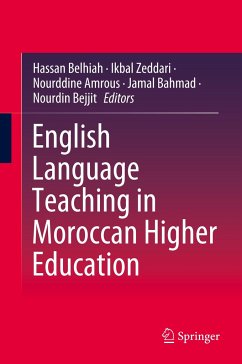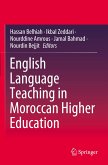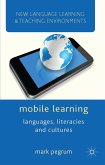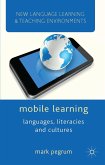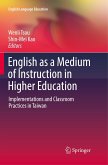English Language Teaching in Moroccan Higher Education
Herausgegeben:Belhiah, Hassan; Zeddari, Ikbal; Amrous, Nourddine; Bahmad, Jamal; Bejjit, Nourdin
English Language Teaching in Moroccan Higher Education
Herausgegeben:Belhiah, Hassan; Zeddari, Ikbal; Amrous, Nourddine; Bahmad, Jamal; Bejjit, Nourdin
- Gebundenes Buch
- Merkliste
- Auf die Merkliste
- Bewerten Bewerten
- Teilen
- Produkt teilen
- Produkterinnerung
- Produkterinnerung
This book explores the global spread of English and its ramifications for the status of English in Morocco. It sheds light on motivational issues in English language teaching and learning in Moroccan higher education and examines various teaching practices in terms of: teaching effectiveness, assessment and evaluation, written feedback, English-Arabic translation, and undergraduate supervision. In addition to identifying critical issues in the discipline of English studies and the main challenges facing English departments from historical, institutional, and pedagogical perspectives, it suggests strategies for addressing and overcoming them. …mehr
Andere Kunden interessierten sich auch für
![English Language Teaching in Moroccan Higher Education English Language Teaching in Moroccan Higher Education]() English Language Teaching in Moroccan Higher Education75,99 €
English Language Teaching in Moroccan Higher Education75,99 €![Key Issues in English for Specific Purposes in Higher Education Key Issues in English for Specific Purposes in Higher Education]() Key Issues in English for Specific Purposes in Higher Education112,99 €
Key Issues in English for Specific Purposes in Higher Education112,99 €![Key Issues in English for Specific Purposes in Higher Education Key Issues in English for Specific Purposes in Higher Education]() Key Issues in English for Specific Purposes in Higher Education112,99 €
Key Issues in English for Specific Purposes in Higher Education112,99 €![Conferencing and Presentation English for Young Academics Conferencing and Presentation English for Young Academics]() Michael GuestConferencing and Presentation English for Young Academics67,99 €
Michael GuestConferencing and Presentation English for Young Academics67,99 €![Mobile Learning Mobile Learning]() M. PegrumMobile Learning75,99 €
M. PegrumMobile Learning75,99 €![Mobile Learning Mobile Learning]() M. PegrumMobile Learning75,99 €
M. PegrumMobile Learning75,99 €![English as a Medium of Instruction in Higher Education English as a Medium of Instruction in Higher Education]() English as a Medium of Instruction in Higher Education119,99 €
English as a Medium of Instruction in Higher Education119,99 €-
-
-
This book explores the global spread of English and its ramifications for the status of English in Morocco. It sheds light on motivational issues in English language teaching and learning in Moroccan higher education and examines various teaching practices in terms of: teaching effectiveness, assessment and evaluation, written feedback, English-Arabic translation, and undergraduate supervision. In addition to identifying critical issues in the discipline of English studies and the main challenges facing English departments from historical, institutional, and pedagogical perspectives, it suggests strategies for addressing and overcoming them.
Produktdetails
- Produktdetails
- Verlag: Springer / Springer Nature Singapore / Springer, Berlin
- Artikelnr. des Verlages: 978-981-15-3804-9
- 1st edition 2020
- Seitenzahl: 272
- Erscheinungstermin: 16. April 2020
- Englisch
- Abmessung: 241mm x 160mm x 21mm
- Gewicht: 532g
- ISBN-13: 9789811538049
- ISBN-10: 9811538042
- Artikelnr.: 58694530
- Herstellerkennzeichnung
- Springer-Verlag GmbH
- Tiergartenstr. 17
- 69121 Heidelberg
- ProductSafety@springernature.com
- Verlag: Springer / Springer Nature Singapore / Springer, Berlin
- Artikelnr. des Verlages: 978-981-15-3804-9
- 1st edition 2020
- Seitenzahl: 272
- Erscheinungstermin: 16. April 2020
- Englisch
- Abmessung: 241mm x 160mm x 21mm
- Gewicht: 532g
- ISBN-13: 9789811538049
- ISBN-10: 9811538042
- Artikelnr.: 58694530
- Herstellerkennzeichnung
- Springer-Verlag GmbH
- Tiergartenstr. 17
- 69121 Heidelberg
- ProductSafety@springernature.com
Hassan Belhiah holds a PhD (2005) in English from the University of Wisconsin in Madison and is currently an Associate Professor of English and Linguistics at Mohammed V University in Rabat, Morocco. Dr Belhiah has presented his research at conferences in the UK, Spain, Switzerland, Germany, Turkey, Morocco, UAE, and the US. His publications have appeared in Classroom Discourse, Journal of Pragmatics, The Modern Language Journal, Language Policy, and Applied Linguistics. Ikbal Zeddari is an Associate Professor and Chair of the English Department at the Faculty of Letters and Humanities, Mohammed V University in Rabat, Morocco. Holding a doctorate in Applied Linguistics and TEFL, his main research interests lie in the area of second language acquisition. More particularly, he investigates lexico-semantic phenomena at the syntax-semantics interface. He is also interested in higher education pedagogy, with a focus on student experiences and teaching methodologies. Nourddine Amrous is an Associate Professor at the Faculty of Letters and Humanities, Mohammed V University in Rabat, Morocco, where he teaches courses on e.g. syntax, stylistics, composition, and spoken English. Holding a doctorate in Education (2006), his main research interests include second language acquisition, language teaching, teacher training, and theoretical linguistics. Jamal Bahmad is an Assistant Professor of Literature and Cultural Studies at the Department of English, Mohammed V University in Rabat, Morocco. He earned his PhD from the University of Stirling (UK, 2014) with a dissertation on contemporary Moroccan urban cinema. He specialises in the field of North African cultural studies with a focus on cinema, cities, literature, memory, and youth cultures. Nourdin Bejjit is an Associate Professor at the Faculty of Letters, Mohammed V University in Rabat, Morocco, where he teaches courses on print culture, British culture and history, and worldliterature. He earned his PhD (2009) in colonial and postcolonial book history from the Open University, and previously received his MA (2004) in national and international literatures in English from the University of London. His research interests include book history, postcolonial literature, and travel writing.
Chapter 1. English Language Teaching in Moroccan Higher Education: An Introduction (Hassan Belhiah).- Part 1: English: Evolution and Spread.- Chapter 2. The Making of an English Department (1975-1982): A Personal Account (Hassan Mekouar).- Chapter 3. English as a Global Language in Morocco: A Qualitative study of Students' Motivations for Studying English (Hassan Belhiah).- Chapter 4. Reflections on the Evolution of the LMD Reform: The English Department as a Case Study (Yamina El Kirat El Allame).- Part 2: Motivation towards English.- Chapter 5. English as an Alternative Cultural Capital for University EFL Students in Morocco (Adil Azhar).- Chapter 6. University Teachers' Perspectives on Adopting EMI in Morocco (Youssef Nadri).- Chapter 7. L2 Motivational Self and English Department Students' Intended Effort (Nourddine Amrous).- Chapter 8. Motivations, Attitudes and Introspections of Moroccan Undergraduate Students towards Major Selection (Abdellatif Bouhlal).- Part 3: Teaching Practices.- Chapter 9. Beliefs on English Language Teaching Effectiveness in Moroccan Higher Education (Amina Ichbah).- Chapter 10. Teaching Translation to Moroccan University Students: Challenges and Perspectives (Abderrazak Gharafi).- Chapter 11. Final Year Research Supervision in the English Department: Attributes, Challenges, and Supervisory Practices (Ikbal Zeddari).- Part 4: Curricular Innovations.- Chapter 12. A Citizenship Approach to Learning and Engagement in Moroccan Higher Education (Said Zaidoune).- Chapter 13. Teaching/Learning English through Digitalized Curricula: Challenges and Prospects (Mohamed Dellal).- Part 5: Challenges and Future Prospects.- Chapter 14. Challenges to the Mission of the English Department in Morocco (Hssein Khtou).- Chapter 15. Scientific Research and Human National Development in Moroccan Universities: An Empirical and Attitudinal Assessment of Status-Quo and Challenges from a Postgraduate Perspective (Abdelghani Ennam).- Chapter 16. The Challenges and Future of the English Department in Neoliberal Morocco (Jamal Bahmad).
Chapter 1. English Language Teaching in Moroccan Higher Education: An Introduction (Hassan Belhiah).- Part 1: English: Evolution and Spread.- Chapter 2. The Making of an English Department (1975-1982): A Personal Account (Hassan Mekouar).- Chapter 3. English as a Global Language in Morocco: A Qualitative study of Students' Motivations for Studying English (Hassan Belhiah).- Chapter 4. Reflections on the Evolution of the LMD Reform: The English Department as a Case Study (Yamina El Kirat El Allame).- Part 2: Motivation towards English.- Chapter 5. English as an Alternative Cultural Capital for University EFL Students in Morocco (Adil Azhar).- Chapter 6. University Teachers' Perspectives on Adopting EMI in Morocco (Youssef Nadri).- Chapter 7. L2 Motivational Self and English Department Students' Intended Effort (Nourddine Amrous).- Chapter 8. Motivations, Attitudes and Introspections of Moroccan Undergraduate Students towards Major Selection (Abdellatif Bouhlal).- Part 3: Teaching Practices.- Chapter 9. Beliefs on English Language Teaching Effectiveness in Moroccan Higher Education (Amina Ichbah).- Chapter 10. Teaching Translation to Moroccan University Students: Challenges and Perspectives (Abderrazak Gharafi).- Chapter 11. Final Year Research Supervision in the English Department: Attributes, Challenges, and Supervisory Practices (Ikbal Zeddari).- Part 4: Curricular Innovations.- Chapter 12. A Citizenship Approach to Learning and Engagement in Moroccan Higher Education (Said Zaidoune).- Chapter 13. Teaching/Learning English through Digitalized Curricula: Challenges and Prospects (Mohamed Dellal).- Part 5: Challenges and Future Prospects.- Chapter 14. Challenges to the Mission of the English Department in Morocco (Hssein Khtou).- Chapter 15. Scientific Research and Human National Development in Moroccan Universities: An Empirical and Attitudinal Assessment of Status-Quo and Challenges from a Postgraduate Perspective (Abdelghani Ennam).- Chapter 16. The Challenges and Future of the English Department in Neoliberal Morocco (Jamal Bahmad).

